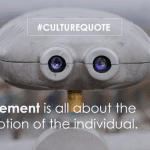Engagement is all about the perception of the individual.
Employee engagement is not a new concept: for decades, organizations have been running variously-named surveys all seeking to understand the commitment levels of their workforce. These surveys have been known as “employee attitude surveys,” “satisfaction surveys,” or “employee voice surveys,” but most recently, the consensus has settled on “engagement.”
We define engagement as the degree to which individuals in an organization are involved, committed, and psychologically invested in their work, their job, and their organization. At the core of this concept is the individual’s reaction to the environment in the workplace. It’s about the bond between the individual and the organization, as seen from the individual’s point of view. It’s about how individuals feel about themselves and their work, and it is a pretty good predictor of an individual’s job performance.
So, how does an individual’s experience fit in to the organizational culture as a whole?
The system influences the engagement of the individual.
Organizational culture focuses on the overarching system, and surveys about organizational culture are about how an individual perceives and experiences that system. And as it turns out, measures of the system are better predictors of performance over time than are survey results of individual experiences of that organization. One of the most basic influences on engagement of individuals is the organizational system which has been created. So the culture of that system has a big impact on the individual’s engagement or lack thereof.
Individuals create the system
Over the short term, the system has a powerful impact on the engagement of the individuals within it. But over the long term, that system is comprised of the people, their inputs, their contributions, their strategies, and the lessons that they’ve learned. Engagement may only be one piece to the organizational puzzle, but it essential for building a coherent picture. Individuals need a clear, empowering, and mission-oriented structure to succeed, but organizational culture needs engaged employees to thrive.
Do you want to learn more about the relationship between employee engagement and organizational culture? Listen to our webinar, “What’s the Difference Between Organizational Culture and Employee Engagement?”




